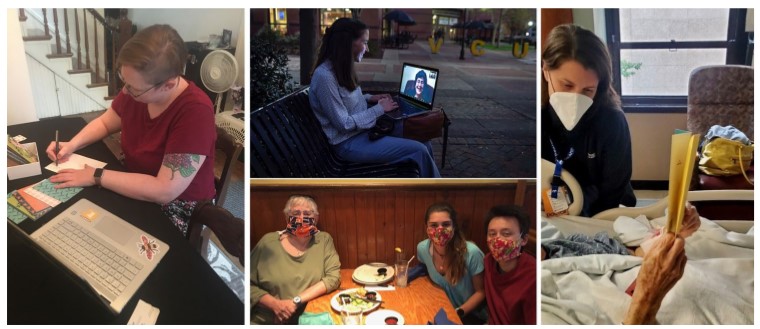
A simple social calling model launched during the pandemic gave medical students real-life practice in geriatric assessment skills while providing socialization opportunities for residents of assisted living communities, according to an on-demand panel presentation at the AMDA — The Society for Post-Acute and Long-Term Care Medicine PALTC 21 Virtual Annual Conference.
The meeting kicked off Thursday and ended Sunday.
Sarah Hobgood, M.D., an associate professor at Virginia Commonwealth University in Richmond, VA, said that when the pandemic began, medical students immediately were removed from patient care and felt stranded and lost. As a physician, she was fielding phone calls from families of assisted living residents about not being able to connect with their loved ones.
The American Geriatrics Society student chapter at VCU launched a social calls program in March 2020 that paired medical students with assisted living residents through weekly phone calls. Students from the health sciences schools of medicine, dentistry, nursing and pharmacy, as well as in the College of Health Professions — which includes occupational and physical therapy as well as gerontology — participated.
“The students took it and ran,” Hobgood said. “It became an effective strategy for driving companionship.”
A simple program
The simple phone call program, which Hobgood called a “low-tech solution requiring minimal staff time during a time of competing interests,” included a conversation guide with open-ended questions and talking cues as well as acknowledgements about how residents were feeling about the pandemic.
The program grew over time, Hobgood said. It began with calls to residents in four assisted living communities that already had partnerships with the school and evolved into a multi-pronged referral process that allowed residents to call a central hotline number and request to be paired with a student. The program eventually grew to 20 assisted living communities. Geriatric clinic providers also began referring patients, and a partnership with a local senior apartment complex led to wellness checks and additional socialization calls.
Residents with physical limitations that prevented a phone or Zoom call could participate in a letter-writing campaign. Students delivered unsealed and unaddressed cards to communities, which delivered them to residents. The letter-writing campaign, which resulted in almost 100 cards delivered to three local assisted living communities, eventually expanded to VCU Health, the academic medical center.
Mutually beneficial
The program was intended to provide companionship to residents during a crisis while providing hands-on health professional education for students, but VCU Education Administrator Chuck Alexander said the program proved to be mutually beneficial to both groups.
“The older adults enjoy the opportunity to mentor or teach the next generation of medical professionals,” Alexander said. “It also offers extensive socialization opportunities for both the student and the older adult.”
Alexander said the “shared trauma” of the pandemic, along with the reality of the quarantine, and the isolation, depression and loneliness that resulted, was the catalyst for the program.
Hobgood said the program provided a “constant and stable social event for an otherwise socially isolated older adult.” Basic wellness checks for medication and food added another layer of protection “during an incredibly challenging time for all of us.”
As of last fall, 94 students were recruited from across the health professional schools, and 41 were assigned to older adults, with the remaining students waiting for assignments. Although the average call duration was 30 minutes, Master of Public Health degree student Tiffany Tsay said that calls ranged from a five-minute check-in to a two-hour conversation. Students made more than 120 calls that totaled 70 hours in duration.
Interest among students and a desire to volunteer provided sufficient numbers for sustaining referrals even after the pandemic, Tsay said.
“It’s an amazing outcome of a really terrible, tragic event,” Hobgood said. “It offered career development for health professional students, personal development and unexpected friendships.”
Wellness Calls program
One month into the partnership, the student group partnered with Dominion Place, an affordable senior housing apartment complex. During the pandemic, staff members shifted to a remote model and were tasked with conducting weekly wellness calls to Dominion’s 200-plus residents.
The partnership with the students extended Dominion’s staffing capacity and also increased socialization opportunities for residents. In the fall, students used the calls to disseminate additional information about voting during the November election.
The Dominion Wellness Calls program operated for 28 weeks, with more than 1,400 connected calls with residents. Overall, students connected and interacted with approximately 20% of Dominion’s residents from week to week.
Several health systems across the country have adopted similar programs during the pandemic, including Villanova University in Villanova, PA, Northwestern University in Evanston, IL, New York University in New York City and Temple University in Philadelphia.




